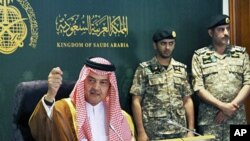Analysts studying the popular uprisings now shaking much of the Arab world are beginning to wonder if the turmoil could spread to Saudi Arabia, an absolute monarchy that is the world’s biggest oil exporter and a key U.S. ally. There are already calls for political reform in Saudi Arabia, and now, efforts to organize unprecedented public protests.
When a popular uprising ousted the government of Tunisia in January, experts predicted there could be similar revolts in other Arab nations with authoritarian governments. In short order, uprisings did break out in Egypt, Yemen, Jordan, Libya and the island nation of Bahrain just off the coast of Saudi Arabia.
But despite the turmoil all around the kingdom, many experts continue to insist that a similar uprising is unlikely in a conservative society like Saudi Arabia. Not everyone agrees. Several thousand Saudis have joined Internet groups calling for a "Day of Rage" protest in the capital, Riyadh, on Friday, March 11.. The aim is to push for major political and social reforms in the tightly-controlled Saudi kingdom. Additionally, more than 100 leading Saudi academics, activists and businessmen signed a petition last month urging King Abdullah to enact sweeping reforms, including the establishment of a constitutional monarchy.
Saud Kabli, a political commentator for the Saudi newspaper Al-Watan, says it is "still early to say such things in Saudi Arabia."
"The social environment, in the first place, didn’t reach a critical mass for such a change," said Kabli. "Of course you are going to have some groups calling for a Day of Rage, and you will have some supporters from here and there, but it is [more] driven by sentiment than by reason. ... In Saudi Arabia we still lack this coherent vision, even among different young groups. Awareness is now required in Saudi Arabia and this will take some time for things to evolve."
Noting that public demonstrations are illegal in Saudi Arabia, Kabli says Saudi culture is very traditional and strongly opposes public displays of civil disobedience. In any case, the commentator says change should be gradual because the kingdom has no political parties or parliamentary system. He acknowledges the need for dialogue about needed reforms, but not a regime change.
"We need to have more young people inside the government, inside the leadership promoting the vision of the young people. ... People are calling for a constitutional monarchy," Kabli said. "You can’t have a constitutional monarchy without having a strong parliament, for instance, and awareness of people of setting elections. ... I think what needs to be done is to initiate this process. We need to start a real dialogue to discuss how we are going to take these things forward towards creating a vision."
Perhaps reacting to the turmoil elsewhere in the Arab world, King Abdullah recently announced a $37 billion assistance package including debt forgiveness and a 15 percent cost-of-living increase for public-sector employees. He also offered them interest-free loans for those about to marry and to start up businesses.
But for the group of Saudi academics, activists and businessmen who petitioned the king last month, financial giveaways were not enough. They called instead for wide-ranging political reforms, including the right to form political parties and the right to elect the Shura Council. Under Saudi Arabia’s absolute monarchy, the Shura Council is not a legislature, as such, but only a consultative assembly, and its members are all appointed by the king.
Marina Ottaway is director of the Middle East program at the Carnegie Endowment for International Peace in Washington. She says Saudi Arabia is very different from the Arab nations already experiencing popular uprisings, and she predicts political reform there will not be easy.
"Saudi Arabia is one of the most difficult cases," said Ottaway. "You have to start from scratch, and I do not think the U.S. has any clear idea about what kind of process would take Saudi Arabia from where it is now to become a more democratic country, or what is the sequence of changes. Nobody knows."
It is not yet clear whether those pushing for political reforms in Saudi Arabia will be able to organize their planned "Day of Rage" protest (on Friday). If they do, the Saudi Interior Ministry has vowed to do whatever it takes to preserve stability. And if there is violence, the Obama administration could be facing new challenges in balancing its alliance with the Saudi royal family and its emphasis on respect for the right of free speech and peaceful assembly.





